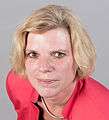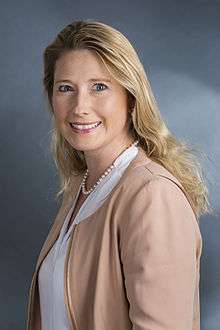Bremen state election, 2015
| |||||||||||||||||||||||||||||||||||||||||||||||||||||||||||||||||||||||||||||||||||||||||||||||||||||||||||||||||||||||
All 83 seats of the Bürgerschaft of Bremen 42 seats needed for a majority | |||||||||||||||||||||||||||||||||||||||||||||||||||||||||||||||||||||||||||||||||||||||||||||||||||||||||||||||||||||||
| |||||||||||||||||||||||||||||||||||||||||||||||||||||||||||||||||||||||||||||||||||||||||||||||||||||||||||||||||||||||
| |||||||||||||||||||||||||||||||||||||||||||||||||||||||||||||||||||||||||||||||||||||||||||||||||||||||||||||||||||||||
A Bremen state election were held on 10 May 2015,[1] to elect the Bürgerschaft (state legislature) as well as the Bremische Stadtbürgerschaft and the Stadtverordnetenversammlung Bremerhaven (city legislatures).[2]
Electoral system
Since the 2011 elections, Bremen has a new electoral system. Each voter may distribute five votes among party lists or candidate inscribed in them. (Cumulative voting and Panachage).[3]
The state of Bremen consists of two cities, Bremen and Bremerhaven. Of the 83 members of the state legislature, 68 are elected in Bremen, 15 in Bremerhaven. To be allocated seats from either Bremen or Bremerhaven a party must receive 5% of the vote or more in the respective city. In Bremen (but not in Bremerhaven), the same ballot is used to determine the composition of the city legislature, also consisting of 68 members who in most cases are the same as Bremen's representatives in the state legislature. Differences may, however, arise since EU citizens resident in Bremen who are not also German citizens may vote in city legislature elections but not in state legislature elections.[4] In the 2003 elections, the 2007 elections, and the current election, this led to one or more of Bremen's seats being allocated to different candidates in the state legislature and in the city legislature.
The state government (Senate), the head of state government (President of the Senate), and the heads of the city governments (Mayor) are later elected by the respective legislatures.
Suffrage
All Germans who have lived in Bremen for at least three months prior to the election are eligible to vote. As of the last election, the voting age is 16, the eligibility age 18. Non-German EU citizens resident in Bremen may vote in city legislature elections but not in state legislature elections which for German citizens in Bremen (but not in Bremerhaven) happen with the same votes on the same ballot.
Pre-election standings
Following the election in 2011, the Social Democrats and Greens continued their coalition government from the previous legislative period. The composition changed several times since the last election following the death of Renate Möbius, Martin Korol took her place in the SPD caucus. He later left the party and sat as an independent before joining the Citizens in Rage. For the CDU, Oğuzhan Yazıcı replaced Elisabeth Motschmann when she was elected to the Bundestag. There were personnel changes in the caucus of Alliance '90/The Greens as well.
Opinion polls
| Pollster | Date | SPD | CDU | Greens | Left | AfD | FDP | Pirates | Others |
|---|---|---|---|---|---|---|---|---|---|
| FGW | 07.05.2015 | 36% | 23% | 15% | 8.5% | 5% | 6.5% | — | 6% |
| Infratest
dimap |
30.04.2015 | 37% | 22% | 16% | 8% | 5% | 6% | — | 6% |
| FGW | 30.04.2015 | 37% | 23% | 15% | 9% | 5% | 5% | — | 6% |
| INSA | 23.04.2015 | 37% | 25% | 12% | 9% | 5% | 6% | — | 6% |
| Infratest
dimap |
18.04.2015 | 38% | 23% | 16% | 6% | 5% | 5% | — | 7% |
| FGW | 26.06.2014 | 40% | 28% | 16% | 8% | 3% | — | — | 5% |
| Emnid | 14.02.2014 | 37% | 21% | 17% | 9% | 5% | 3% | 3% | 5% |
| Source:[5] | |||||||||
Results
< 2011 ![]() Next >
Next >
| Party | Popular vote | Seats | |||||
|---|---|---|---|---|---|---|---|
| Votes | % | +/– | Seats | +/– | |||
| Social Democratic Party of Germany Sozialdemokratische Partei Deutschlands – SPD|| 383,509 | 32.8 | | 29 | | |||
| Christian Democratic Union Christlich Demokratische Union Deutschlands – CDU|| 261,929 | 22.4 | | 20 | | |||
| Alliance '90/The Greens Bündnis 90/Die Grünen|| 176,807 | 15.1 | | 14 | | |||
| Left Die Linke|| 111.485 | 9.5 | | 8 | | |||
| Free Democratic Party Freie Demokratische Partei – FDP|| 76,754 | 6.5 | | 6 | | |||
| Alternative for Germany Alternative für Deutschland – AfD|| 64,368 | 5.5 | N/A | 5 | N/A | |||
| Citizens in Rage Bürger in Wut – BIW|| 37,759 | 3.2 | | 1 | | |||
| Die PARTEI Partei für Arbeit, Rechtsstaat, Tierschutz, Elitenförderung und basisdemokratische Initiative|| 21,888 | 1.9 | N/A | 0 | N/A | |||
| Pirate Party Germany Piratenpartei Deutschland|| 17,773 | 1.5 | | 0 | | |||
| Human Environment Animal Protection Mensch Umwelt Tierschutz|| 13,910 | 1.2 | N/A | 0 | N/A | |||
| National Democratic Party of Germany Nationaldemokratische Partei Deutschlands - NPD|| 2,170 | 0.2 | | 0 | | |||
| Turnout | 1,168,352 | 50.2 | |
||||
| Electorate | 2,327,394 | 100.00 | |||||
Provisional results; the AfD did not reach the 5% threshold in Bremerhaven (and will hence only receive seats for votes from Bremen), the BIW did not reach the threshold in Bremen (and will only receive one seat in Bremerhaven, none in Bremen).[6][7]
Aftermath
Analysts expressed surprise about the low turnout of just 50.1% (the lowest since 1945 in state legislature elections in a West German state) and concern about a particularly low turnout in poor areas which was seen as a hint at the disillusionment of the poor with politics.[8] The unexpectedly meager result of the SPD prompted the President of the Senate (head of the state government) and Mayor (head of the city government), Jens Böhrnsen, to resign. Since his governing coalition (the SPD and the Greens) still received a majority of seats, it was, however, expected that the coalition would continue with a new head of government.[9]
References
- ↑ "Die nächsten Landtags- und Kommunalwahlen in Deutschland" [The next state and local elections in Germany]. Wahlrecht.de. 12 March 2014. Retrieved 21 September 2014.
- ↑ "Wahlen". Bremen. Retrieved December 3, 2010.
- ↑ "BremWahlG" [Bremen Electoral Law] (in German). Gesetzesportal. Retrieved 22 September 2014.
- ↑ "Bremer Wahl-ABC" (in German). Statistisches Landesamt Bremen (Statistical Office of the State of Bremen). Retrieved 18 May 2015.
- ↑ "Umfragen Bremen" [Polls Bremen] (in German). Wahlrecht.de. Retrieved 22 September 2014.
- ↑ "Bürgerschafts- und Beirätewahlen 2015, Vorläufiges Endergebnis" [2015 elections for Bürgerschaft and Beiräte (state, city, and local legislature), preliminary results] (in German). Statistisches Landesamt Bremen (Statistical Office of the State of Bremen). Retrieved 18 May 2015.
- ↑ "Bürgerschaftswahl am 10. Mai 2015 in Bremen".
- ↑ "Ärmere gehen seltener zur Wahl" [The poor participate less often in elections] (in German). Nordwest Zeitung. Retrieved 18 May 2015.
- ↑ "Bremen Mayor Jens Böhrnsen declines rerturning to chief minister's post". Deutsche Welle. Retrieved 18 May 2015.






